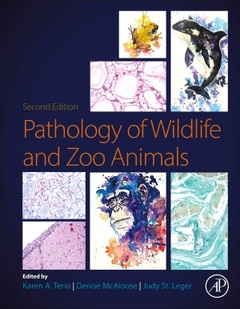Description
Pathology of Wildlife and Zoo Animals (2nd Ed.)
Language: English
Subjects for Pathology of Wildlife and Zoo Animals:
Keywords
Veterinary pathology; wildlife; zoo; non-domestic species; conservation; zoonoses; COVID-19; necropsies
1150 p. · 21.5x27.6 cm · Hardback
Description
/li>Contents
/li>Biography
/li>Comment
/li>
Pathology of Wildlife and Zoo Animals, Second Edition is the much-anticipated update to the leading resource on the study of diseases in non-domestic species. The book offers comprehensive coverage of the pathology of wildlife and zoo species, including a wide scope of animals, disease types and geographic regions. Chapters include information on performing necropsies, proper techniques to meet the specialized needs of forensic cases, laboratory diagnostics, and an introduction to basic principles of comparative clinical pathology. The taxon-based chapters provide information about diseases in related groups of animals and include descriptions of gross and histologic lesions, pathogenesis and diagnostics. For each group of animals, notable, unique, gross and microscopic anatomical features are provided to further assist the reader in deciding whether differences from the domestic animal paradigm are "normal." Additional online content, which includes text, images and whole scanned glass slides of selected conditions expand the published material thus resulting in a comprehensive approach to the topic.
1. Wildlife Necropsy 2. Forensic Wildlife Pathology 3. Wildlife Zoonoses 4. Laboratory Diagnostics 5. Introduction to Comparative Clinical Pathology 6. Bovidae, Antilocapridae, Giraffidae, Tragulidae, Hippopotamidae 7. Cervidae 8. Camelidae 9. Suidae and Tayassuidae 10. Canidae, Ursidae, and Ailuridae 11. Felidae 12. Mustelidae 13. Procyonidae, Viverridae and Ursidae 14. Prosimians 15. New World and Old World Monkeys 16. Apes 17. Proboscidea 18. Perissodactyla 19. Monotremes and Marsupials 20. Lagomorpha 21. Rodentia 22. Xenartha, Erinacoemorpha, Eutheria, and Afrotheria 23. Cetacea 24. Pinnipediae 25. Sirenia 26. Chiroptera 27. Struthioniformes 28. Sphenisciformes, Gaviiformes, Podiceipediformes, Procellariiformes,and Pelecaniformes 29. Phoenicopteriformes 30. Anseriformes, Ciconiiformes, Charadriiformes, and Gruiformes 31. Birds of Prey 32. Galliformes and Columbiformes 33. Psittaciformes, Coliiformes, Musophagiformes, and Cuculiformes 34. Passeriformes, Trochiliformes, Coraciiformes, Caprimulgiformes, Apodiformes, and Piciformes 35. Chelonia 36. Crocodilia 37. Lacertilia 38. Serpentis 39. Amphibia 40 Osteichthyes (Freshwater and Marine) 41. Chondrichthes 42. Invertebrates Appendix A: Viral Families and Documented Diseases
Dr. McAloose directs the pathology and molecular diagnostic laboratories at the WCS, which provide diagnostic services and consultation to the organization’s 4 zoos and aquarium in New York City and their local and international conservation projects in over 40 countries. She is an advisor for the Association of Zoos and Aquariums (AZA) Felid Taxon Advisory Group and individual felid and canid Species Survival Plans (SSP) as well as a member of the National Marine Fisheries Services/National Oceanographic and Atmospheric Administration’s Working Group for Unusual Marine Mammal Mortality Events. She is also a Senior Courtesy Lecturer at Cornell University’s School of Veterinary Medicine and a Clinical Assistant Professor of Pathology at the Albert Einstein College of Medicine of Yeshiva University.
Dr. St. Leger is a graduate of the veterinary school at Cornell University and completed her residency training at the UC Davis diagnostic laboratory in San Bernardino, California. Her work includes investigations in health of aquatic animals and birds, such as marine mammal viral screening, pathogenesis of select infectious agents in marine species, and killer whale disease concerns. Dr. St. Leger has published many scientific manuscripts and is a frequent lecturer on t
- Features thorough updates to each chapter of this 2019 PROSE Award Winner in Biological and Life Sciences
- Focuses on zoonoses and the COVID-19 pandemic with newly introduced content
- Provides consistent organization of chapters with descriptions of unique anatomic features, common non-infectious and infectious diseases following brief overviews of the taxonomic group
- Links to a large online library of scanned slides relating to topics in the book that illustrate important histologic findings
These books may interest you

Zoo and Wild Animal Dentistry 225.05 €



